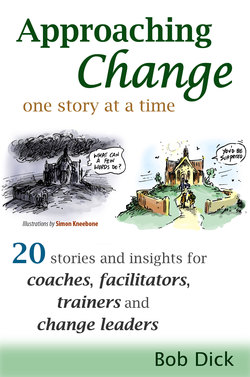Читать книгу Approaching Change One Story At a Time: 20 Stories and Insights for Coaches, Facilitators, Trainers and Change Leaders - Bob Dick - Страница 8
На сайте Литреса книга снята с продажи.
The golden cufflinks
ОглавлениеDee Hock in his book One from many relates that, in the early 1970s, National BankAmericard rescued the Bank of America’s faltering US credit card business from possible failure. Other licensees throughout the world then pressured BankAmericard to do the same for them.
Each licensee had different systems. There were currency and language and cultural differences. Legal systems differed. The internet didn’t yet exist to provide the motivation for standards across nations; this was still in the days of punch cards and computer tape. An organising committee was set up to plan how a combined cooperative system would work.
Negotiations were prolonged and often bitter. Despite this, progress was slowly made. Eventually only three disagreements remained. Though they seemed insurmountable a final meeting was organised to resolve them. The differences were great and positions were polarised. Nobody was optimistic.
Dee Hock was chair of the organising committee. When he thought back over the successes they had achieved, he realised, as he puts it, that “at critical moments, all participants had felt compelled to succeed. And at those same moments, all had been willing to compromise.” It hadn’t been about winning or losing. That was transcended by a larger sense of purpose. It was supported by a sense of community that rendered individual needs less pressing.
That gave him an idea for the final meeting. He asked a local jeweller to cast sets of golden cuff links. On one of the cuff links was half of the globe and the Latin phrase for “the will to succeed.” On the other link was the remaining half of the globe and the phrase in Latin, “the grace to compromise”.
The final meeting was as polarised as expected. After some heated discussion the participants from the Canadian banks refused to compromise any further. They said they would withdraw from the agreement.
At that point Dee Hock adjourned the meeting. He asked the participants to reconvene the next morning so they could plan how to disband. In recognition of how hard they had worked over two years as they tried to reach an agreement, he proposed a grand dinner that evening.
___
They assembled for the dinner. After food and wine, Dee asked for permission to address the participants briefly. It was given.
A small gift box was placed in front of each person. It opened to reveal the cufflinks. He explained that it was no failure to fall short of realising such an ambitious dream. He wanted them to have a memento of their efforts — something that would be appropriate whether or not they succeeded.
He described the cufflinks. He drew their attention to the half-world on one cuff-link, and the Latin phrase, Studium ad prosperandum. “The will to succeed”, he explained. The other cufflink was in the form of the other half of the world. The motto was Voluntas in conveniendum — the grace to compromise. He explained that as agreement now seemed unattainable, they would meet on the next morning to plan how they would disband.
He asked one last thing of them: “Will you please bring your cufflinks to the meeting in the morning?” The cufflinks would remind them for the rest of their life, he said, that the task of uniting the world was too great. They were unable to find the will to succeed and the grace to compromise.
He continued that, if some miracle occurred, their differences might dissolve. And if so, then for the rest of their life they would carry with them a different reminder. When it really mattered, they were able to find the will to succeed and the grace to compromise.
He sat down. There was silence as people examined their gifts.
Then one of the Canadians broke the silence. He shouted, ”You miserable bastard!“ The room erupted in laughter.
The next morning everyone was wearing the cuff links. The miracle did happen. By noon, agreement was reached on the outstanding issues. The Canadians rejoined the agreement. The system was planned. VISA International came into being.
I think you can see the advantage of first-person stories over second-person stories. Some of the questions we might have about Dee Hock’s experience we can’t clarify. We are left wondering (at least, I am left wondering) did he intervene to create the self-organising system in the first of the two stories?
If he did, exactly what was it that he did?
And if he didn’t, why didn’t it work for me in the university classroom with a class of intelligent and motivated people who didn’t have to be there.
That’s the next story — my experience when I attempted to bring classroom democracy to a group of people.
It was an advantage that each class lasted a year. Every year I could begin over again. That allowed me, through trial and error, to discover what was required before democracy could be achieved.
Over the years I’ve encountered more than a few academics who attempted to create a democratic university class. Most of them abandoned the attempt because they couldn’t get it to work for them.
